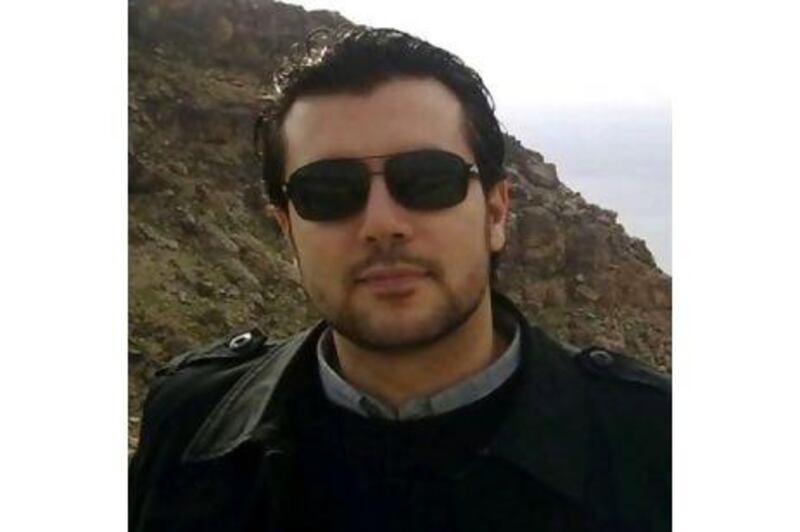The focus of the international investigation into a suicide bombing in Sweden switched yesterday to the English town of Luton.
Taimour Abdulwahab al Abdaly, identified as the suicide bomber who killed himself when he triggered two devices in a busy Stockholm shopping district on Saturday, lived and raised a family in the town some 45 kilometres north of London.
As the British prime minister David Cameron held discussions with his Swedish counterpart Frederick Reinfeldt, investigators in both countries tried to ascertain if al Abdaly acted alone or had accomplices.
Al Abdaly, who would have been 29 on Sunday, emigrated from Iraq to Sweden in 1992 and became a Swedish national. In 2001, under the name Taimour Abdulwahab, he enrolled at the University of Luton and graduated with a degree in sports therapy.
He married Mona, a beauty therapist, the same year, fathered three children - two girls, aged three and one, and a boy born this year - and was last seen in the town a fortnight ago. He told his family he was going on a business trip to the Middle East.
But on Saturday, the car he had been driving loaded with gas cylinders blew up and, about 15 minutes later, he is believed to have detonated a suicide vest on a nearby street. Two people were injured.
An army explosives expert told the Swedish newspaper Aftonbladet that the attack had been "amateurish from a technical point of view".
Only one of the six pipe bombs attached to his body exploded, probably because of faulty connections between the bombs and the detonator, the expert said.
As police searched al Abdaly's semi-detached home in a quiet street yesterday, a primary concern of British investigators was Luton's recent links with Muslim extremists.
The town of 200,000, about 10 per cent of whom are Muslim, was the meeting place of four suicide bombers as they set off on July 7, 2005, to kill themselves and 52 commuters on London's transport system.
In March last year, a vocal group of Muslim extremists caused outrage when, during a homecoming parade for soldiers returning from Iraq, they waved placards branding the infantrymen "butchers" and "cowards".
This protest led to the emergence of the far right group the English Defence League, which opposes what it calls the spread of Islam and Sharia law in England. The American pastor Terry Jones, who caused fury in the Islamic world this year with a plan to burn copies of the Quran, plans to travel to Britain in February after receiving an invitation from the group. Al Abdaly himself prayed at the Luton Islamic Centre Mosque until 2007, when he was confronted by members of the mosque who had become concerned that he was trying to present a "distorted" view of Islam.
Police obtained a warrant under the Terrorism Act on Sunday night to search al Abdaly's home, which was yesterday cordoned off as anti-terrorist officers and forensic scientists went in and out. "No arrests have been made and no hazardous materials found," said a police spokesman.
Neighbours, who saw the authorities remove three children from the house early yesterday, said they knew little of al Abdaly, who moved into the house about a year ago, but said he seemed a pleasant, quiet, family man.
He was apparently looking for a second wife, writing on the Muslima dating website: "I want to get married again, and would like to have a big family. My wife agreed to this."
Describing himself as a practising Sunni Muslim who "wants to please Allah before me", al Abdaly said that he worked as a physical therapist and was financially "OK".
He added: "In the future, am looking for to move to a Arabic country and settle down there".
On his Facebook page, which was removed yesterday, he described his "likes" as including "the Islamic Caliphate state" and "Yawm al-Qiyamaah (the Islamic day of judgment)".
The page also contained a video of a blindfolded Iraqi man being taunted and abused by US soldiers.
A police source said that he had recently sent an email to his wife, stressing his love for his family and asking her to kiss their children.
Prior to detonating his device, al Abdaly also sent voice messages to the Swedish security police and a news agency citing Sweden's involvement in Afghanistan and its silence over cartoons of the Prophet Mohammed in 2007 as reasons for his attack.
Speaking in English, al Abdaly said: "Your quietness for the paintings and your support for your soldiers in Afghanistan brought you to this unpleasant situation.
"The Islamic state, may Allah protect it and its people, have now begun to fulfil its promises.
"And do know one thing, we are not a lie or in the imagination, we are for real and do now exist among you Europeans.
"So stop your drawings and stop your drawings of our Prophet Mohammed. Withdraw your soldiers from Afghanistan and no more oppression against Islam or Muslims will be tolerated in any way or any means."
Lars Vilks, the cartoonist who drew the controversial cartoon of the Prophet Mohammed, told Reuters: "Sweden is panicking of course because this has never been the case before that you have an act of terrorism directed towards the public, and this will of course create fear in Sweden.
"It was an act against the Swedish people to scare them and not me. "
Al Abdaly's bombing has fuelled fears across Europe of terrorist attacks after authorities in a number of countries raised the alert level in recent months.
Authorities in Germany have warned that the country's Christmas markets are among possible targets and have dramatically increased the presence of police armed with sub-machineguns in busy public areas. Security measures have included the closure of one of Berlin's top tourist attractions, the glass dome on top of the Reichstag, the historic parliament building.






